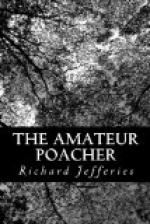’I sets up about four wires, sometimes only two; if you haves so many it is a job to look after ’em. I stops the hare’s other runs, so that she is sure to come along mine where I’ve got the turnpike up: the trick is to rub your hand along the runs as you want to stop, or spit on ’em, or summat like that; for a hare won’t pass nothing of that sort. So pussy goes back and comes by the run as I’ve chose: if she comes quick she don’t holler; if she comes slow she squeals a bit sometimes before the wire hangs her. Very often I bean’t fur off and stops the squealing. That’s why I can’t use a gin—it makes ’em holler so. I ferrets a goodish few rabbits on bright nights in winter.
’As for the pheasants, I gets them mostly about acorn-time; they comes out of the plantations then. I keeps clear of the plantations, because, besides the men a-watching, they have got dogs chained up, and alarm-guns as goes off if you steps on the spring; and some have got a string stretched along as you be pretty sure to kick against, and then, bang! and all the dogs sets up a yowling. Of course it’s only powder, but it brings the keepers along. But when the acorns and the berries be ripe, the pheasants comes out along the hedges after ’em, and gets up at the haws and such like. They wanders for miles, and as they don’t care to go all the way back to roost they bides in the little copses as I told you of. They come to the same copses every year, which is curious, as most of them as will come this year will be shot before next.
’If I can’t get ’em the fust night, I just throws a handful or two of peas about the place, and they’ll be sure to stay, and likely enough bring two or three more. I mostly shoots ’em with just a little puff of powder as you wouldn’t hear across one field, especially if it’s a windy night. I had a air-gun, as was took from me, but he weren’t much go: I likes a gun as throws the shot wide, but I never shoots any but roosters, unless I catch ’em standing still.
’All as I can tell you is as the dodge is this: you watch everybody, and be always in the fields, and always work one parish till you knows every hare in un, and always work by yourself and don’t have no mates.’
There were several other curious characters whom we frequently saw at work. The mouchers were about all the year round, and seemed to live in, or by the hedges, as much as the mice. These men probably see more than the most careful observer, without giving it a thought.
In January the ice that freezes in the ditches appears of a dark colour, because it lies without intervening water on the dead brown leaves. Their tint shows through the translucent crystal, but near the edge of the ice three white lines or bands run round. If by any chance the ice gets broken or upturned, these white bands are seen to be caused by flanges projecting from the under surface, almost like stands. They are sometimes connected in such a way that the




